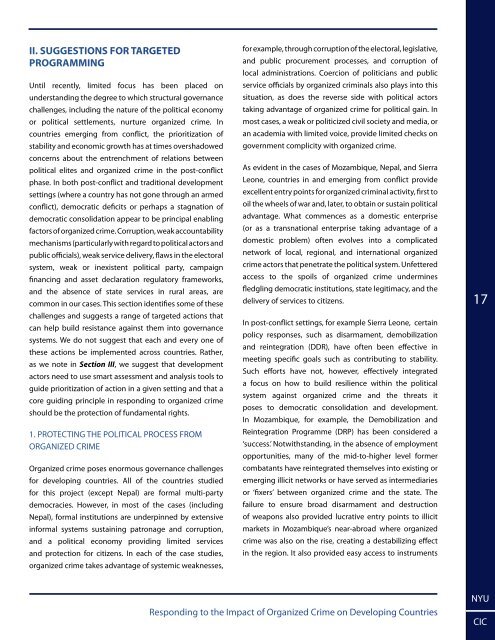here - Center on International Cooperation - New York University
here - Center on International Cooperation - New York University
here - Center on International Cooperation - New York University
Create successful ePaper yourself
Turn your PDF publications into a flip-book with our unique Google optimized e-Paper software.
II. SUGGESTIONS FOR TARGETED<br />
PROGRAMMING<br />
Until recently, limited focus has been placed <strong>on</strong><br />
understanding the degree to which structural governance<br />
challenges, including the nature of the political ec<strong>on</strong>omy<br />
or political settlements, nurture organized crime. In<br />
countries emerging from c<strong>on</strong>flict, the prioritizati<strong>on</strong> of<br />
stability and ec<strong>on</strong>omic growth has at times overshadowed<br />
c<strong>on</strong>cerns about the entrenchment of relati<strong>on</strong>s between<br />
political elites and organized crime in the post-c<strong>on</strong>flict<br />
phase. In both post-c<strong>on</strong>flict and traditi<strong>on</strong>al development<br />
settings (w<str<strong>on</strong>g>here</str<strong>on</strong>g> a country has not g<strong>on</strong>e through an armed<br />
c<strong>on</strong>flict), democratic deficits or perhaps a stagnati<strong>on</strong> of<br />
democratic c<strong>on</strong>solidati<strong>on</strong> appear to be principal enabling<br />
factors of organized crime. Corrupti<strong>on</strong>, weak accountability<br />
mechanisms (particularly with regard to political actors and<br />
public officials), weak service delivery, flaws in the electoral<br />
system, weak or inexistent political party, campaign<br />
financing and asset declarati<strong>on</strong> regulatory frameworks,<br />
and the absence of state services in rural areas, are<br />
comm<strong>on</strong> in our cases. This secti<strong>on</strong> identifies some of these<br />
challenges and suggests a range of targeted acti<strong>on</strong>s that<br />
can help build resistance against them into governance<br />
systems. We do not suggest that each and every <strong>on</strong>e of<br />
these acti<strong>on</strong>s be implemented across countries. Rather,<br />
as we note in Secti<strong>on</strong> III, we suggest that development<br />
actors need to use smart assessment and analysis tools to<br />
guide prioritizati<strong>on</strong> of acti<strong>on</strong> in a given setting and that a<br />
core guiding principle in resp<strong>on</strong>ding to organized crime<br />
should be the protecti<strong>on</strong> of fundamental rights.<br />
1. PROTECTING THE POLITICAL PROCESS FROM<br />
ORGANIZED CRIME<br />
Organized crime poses enormous governance challenges<br />
for developing countries. All of the countries studied<br />
for this project (except Nepal) are formal multi-party<br />
democracies. However, in most of the cases (including<br />
Nepal), formal instituti<strong>on</strong>s are underpinned by extensive<br />
informal systems sustaining patr<strong>on</strong>age and corrupti<strong>on</strong>,<br />
and a political ec<strong>on</strong>omy providing limited services<br />
and protecti<strong>on</strong> for citizens. In each of the case studies,<br />
organized crime takes advantage of systemic weaknesses,<br />
for example, through corrupti<strong>on</strong> of the electoral, legislative,<br />
and public procurement processes, and corrupti<strong>on</strong> of<br />
local administrati<strong>on</strong>s. Coerci<strong>on</strong> of politicians and public<br />
service officials by organized criminals also plays into this<br />
situati<strong>on</strong>, as does the reverse side with political actors<br />
taking advantage of organized crime for political gain. In<br />
most cases, a weak or politicized civil society and media, or<br />
an academia with limited voice, provide limited checks <strong>on</strong><br />
government complicity with organized crime.<br />
As evident in the cases of Mozambique, Nepal, and Sierra<br />
Le<strong>on</strong>e, countries in and emerging from c<strong>on</strong>flict provide<br />
excellent entry points for organized criminal activity, first to<br />
oil the wheels of war and, later, to obtain or sustain political<br />
advantage. What commences as a domestic enterprise<br />
(or as a transnati<strong>on</strong>al enterprise taking advantage of a<br />
domestic problem) often evolves into a complicated<br />
network of local, regi<strong>on</strong>al, and internati<strong>on</strong>al organized<br />
crime actors that penetrate the political system. Unfettered<br />
access to the spoils of organized crime undermines<br />
fledgling democratic instituti<strong>on</strong>s, state legitimacy, and the<br />
delivery of services to citizens.<br />
In post-c<strong>on</strong>flict settings, for example Sierra Le<strong>on</strong>e, certain<br />
policy resp<strong>on</strong>ses, such as disarmament, demobilizati<strong>on</strong><br />
and reintegrati<strong>on</strong> (DDR), have often been effective in<br />
meeting specific goals such as c<strong>on</strong>tributing to stability.<br />
Such efforts have not, however, effectively integrated<br />
a focus <strong>on</strong> how to build resilience within the political<br />
system against organized crime and the threats it<br />
poses to democratic c<strong>on</strong>solidati<strong>on</strong> and development.<br />
In Mozambique, for example, the Demobilizati<strong>on</strong> and<br />
Reintegrati<strong>on</strong> Programme (DRP) has been c<strong>on</strong>sidered a<br />
‘success.’ Notwithstanding, in the absence of employment<br />
opportunities, many of the mid-to-higher level former<br />
combatants have reintegrated themselves into existing or<br />
emerging illicit networks or have served as intermediaries<br />
or ‘fixers’ between organized crime and the state. The<br />
failure to ensure broad disarmament and destructi<strong>on</strong><br />
of weap<strong>on</strong>s also provided lucrative entry points to illicit<br />
markets in Mozambique’s near-abroad w<str<strong>on</strong>g>here</str<strong>on</strong>g> organized<br />
crime was also <strong>on</strong> the rise, creating a destabilizing effect<br />
in the regi<strong>on</strong>. It also provided easy access to instruments<br />
17<br />
Resp<strong>on</strong>ding to the Impact of Organized Crime <strong>on</strong> Developing Countries<br />
NYU<br />
CIC
















